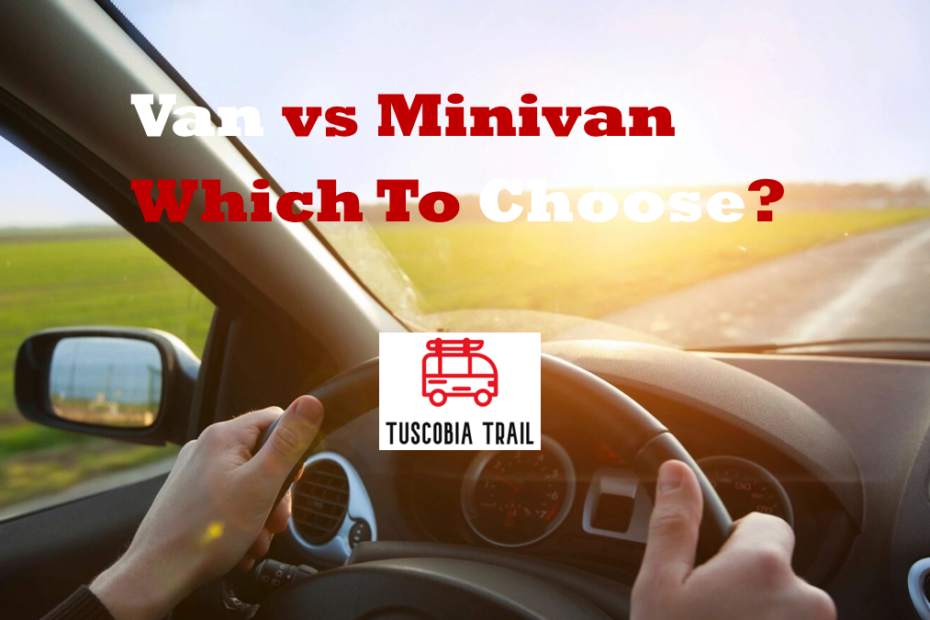Embarking on van life presents a choice between the spaciousness of a van and the comfort of a minivan. Van vs Minivan – which should you choose?
Vans, often used as commercial vehicles, provide ample cargo space and can be fitted with rows of seats or left open for hauling, which is great for those who need to carry lots of gear on their adventures.
Minivans, with their family-friendly features and efficient fuel economy, offer a more car-like driving experience and are easier to maneuver.
Whether you opt for a passenger van like the Mercedes-Benz Sprinter, renowned for its safety and reliability, or a minivan such as the Toyota Sienna with its latest infotainment, the decision hinges on your travel style and space needs.
Van Overview: Incredible Cargo Space & Passenger Capacity
Vans are synonymous with significant cargo space and higher passenger capacity, making them a top pick for businesses or those embarking on van life with a need for ample storage.
These robust vehicles can accommodate more passengers than minivans and their sturdy build is well-suited for heavy loads and demanding work, or transforming them into a spacious, customized home on wheels.
Van: Pros
- The expansive cargo space
- Versatility and customizability
- Ample comfort
- Comfortable internal maneuvering space
Van: Cons
- Size may hinder maneuverability in urban settings
- Lower fuel economy than minivans

Minivan Overview: Outstanding Fuel Economy and Reliable Passenger Van
Minivans strike a balance between practicality and comfort, sporting features like sliding rear doors for easy access and a size that fits comfortably in standard garages.
They are designed with families in mind but also serve well for couples seeking a vehicle that’s both spacious and maneuverable, without compromising on the ease of driving.
Minivan: Pros
- Flexible and customizable seating arrangements
- Efficient fuel economy
- Compact and maneuverable
- Lower floor height makes entry and exit a breeze
Minivan: Cons
- Lack the raw power and towing capacity for large cargo
- Limited cargo space
Van vs Minivan In Detail: Commercial Vans vs Passenger Vans
When delving into the specifics of vans and minivans, it’s important to note that these vehicles cater to different lifestyles. Vans, known for their broad utility as commercial vehicles or multi-purpose vehicles, serve well for those who prioritize space and adaptability.
Minivans, while smaller, provide a seamless blend of utility and comfort, appealing to those who value a vehicle that suits everyday family needs yet is capable of supporting life on the road. While both vehicle types can be equipped to support van life, their inherent characteristics cater to distinct preferences.
Vans offer the ruggedness needed for extensive travel and customization potential, whereas minivans provide a more refined ride with amenities that make long drives more enjoyable. Ultimately, your choice depends on the balance you seek between space, comfort, and drivability.
Performance & Maneuverability
When it comes to performance and maneuverability, each vehicle has its strengths suited for different driving conditions. Vans, with the option for all-wheel drive, can handle a variety of terrains and are ideal for long-distance highway travel.
Minivans, primarily equipped with front-wheel drive, offer better fuel efficiency and are easier to navigate in tight city spaces, making them perfect for urban explorers.
Handling Dynamics: Van vs Minivan
The handling dynamics between a van and a minivan reveal their distinct purposes. Vans like the Ford Transit Connect Wagon or the Mercedes-Benz Metris are designed for durability and load-carrying capacity, offering comfortable seating and a sturdy ride.
Minivans or small vans such as the Kia Carnival are built to be single-person, couple, or family-friendly vehicles, prioritizing ease of use, smooth handling, and accessible features that cater to day-to-day convenience.
Urban Driving: Navigating the Cityscape
In the cityscape, the driving dynamics of minivans are often preferable. Their car-like steering and good visibility combined with modern amenities like parking sensors make them adept at navigating busy streets and fitting into compact parking spaces. Vans, while offering a commanding view of the road, may require more effort to maneuver through congested city environments.
Budgeting For Your Vehicle
When budgeting for your vehicle, it’s crucial to consider both the initial investment and the long-term costs associated with ownership. Full-size vans may command a higher price, especially if equipped with a hybrid powertrain.
On the other hand, minivans are generally more affordable and compete closely with three-row SUVs. Balancing your financial resources with your vehicle needs is a key step in selecting the right companion for your van life adventures.
Initial Costs: Price Comparisons
Comparing the initial costs of full-size vans and minivans can guide your purchasing decision. Full-size vans, while offering more space and versatility, come with a heftier price tag that may impact your budget.
Minivans, on the other hand, provide a more economical entry point without sacrificing essential features, making them an attractive option for those mindful of their spending.
Long-Term Value: Depreciation and Maintenance
When considering the long-term value of your vehicle, factor in depreciation and maintenance costs. Both vans and minivans will depreciate over time, but their robust construction and popular demand can mitigate this effect.
Maintenance expenses can vary, with full-size vans potentially incurring higher costs due to their larger size and commercial-grade parts, while minivans might benefit from more common and affordable components.

Technology & Comfort Features
Both vans and minivans offer a range of technology and comfort features to enhance the driving experience. Minivans stand out with their sliding rear doors, which not only facilitate entry and exit but also add an element of convenience when loading and unloading gear.
Advanced technology features, such as the latest infotainment systems and connectivity options, ensure that life on the road is both comfortable and connected, no matter where your travels take you.
Infotainment and Connectivity
Today’s vehicles are hubs of technology, and staying connected on the go is a must. Vans and minivans alike offer infotainment systems with touchscreen displays, Bluetooth connectivity, and navigation options. While vans may focus on practicality with robust audio systems for a pleasant work environment, the Chrysler Pacifica minivan steps up the game.
This model comes with advanced features geared towards family entertainment, such as Uconnect Theater, a Wi-Fi hotspot, and multiple USB ports to keep everyone plugged in and content during long road trips.
Comfort Levels for Long Journeys
When you’re on the road, comfort is king. Minivans, like the 2022 Chrysler Pacifica, are known for their spacious interiors and plush seating, making them ideal for long-distance family travel. They often feature climate control, ample legroom, and flexible seating configurations for added convenience.
Vans may offer similar space but prioritize durability and function over the soft-touch materials and creature comforts typically found in minivans, which are designed to keep passengers relaxed and happy for hours on end.
Safety & Practicality Considerations
Whether you’re navigating bustling city streets or cruising on the open highway, safety is a paramount concern. Modern vans and minivans are equipped with a suite of safety features to protect you and your passengers.
Airbags, stability control, and backup cameras are standard, but minivans often edge ahead with additional driver assistance systems designed for family safety. Keep in mind, though, that the size of your vehicle affects stopping distances, so always drive with caution, particularly in larger vans.
Innovative Safety Features
In the minivan segment, vehicles like the Honda Odyssey set the bar high with cutting-edge safety innovations. These minivans come loaded with advanced driver aids, such as collision mitigation braking, lane-keeping assist, and adaptive cruise control.
Final Verdict: Van vs Minivan – Which One Should I Buy?
When it comes to choosing between vans and minivans, your decision hinges on what you value most in a vehicle. If you require a robust family hauler with ample passenger seats and the ability to maximize interior space, a minivan with its second-row seats and typically V6 engine might be the go-to choice.
Moreover, American minivans often come with advanced tech features that cater to the needs of a modern family on the move.
On the other hand, if you’re leaning towards a vehicle that’s more suitable for heavy-duty tasks and diverse terrain, vans with their rear-wheel drive and body-on-frame construction offer strength and durability.
